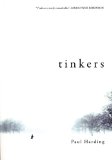Summary | Excerpt | Reviews | Beyond the Book | Readalikes | Genres & Themes | Author Bio

There he lay among the graduation photos and old
wool jackets and rusted tools and newspaper clippings
about his promotion to head of the mechanical-drawing
department at the local high school, and then about his
appointment as director of guidance, and then about his
retirement and subsequent life as a trader and repairer
of antique clocks. The mangled brass works of the
clocks he had been repairing were strewn among the
mess. He looked up three stories to the exposed support
beams of the roof and the plump silver-backed batts of
insulation that ran between them. One grandson or
another (which?) had stapled the insulation into place
years ago and now two or three lengths of it had come
loose and lolled down like pink woolly tongues.
The roof collapsed, sending down a fresh avalanche
of wood and nails, tarpaper and shingles and insulation.
There was the sky, filled with flat-topped clouds, cruising
like a fleet of anvils across the blue. George had the
watery, raw feeling of being outdoors when you are
sick. The clouds halted, paused for an instant, and plummeted
onto his head.
The very blue of the sky followed, draining from
the heights into that cluttered concrete socket. Next fell
the stars, tinkling about him like the ornaments of
heaven shaken loose. Finally, the black vastation itself
came untacked and draped over the entire heap, covering
George’s confused obliteration.
Nearly seventy years before George died, his father,
Howard Aaron Crosby, drove a wagon for his living. It
was a wooden wagon. It was a chest of drawers mounted
on two axles and wooden spoked wheels. There were
dozens of drawers, each fitted with a recessed brass ring,
pulled open with a hooked forefinger, that contained
brushes and wood oil, tooth powder and nylon stockings,
shaving soap and straight-edge razors. There were
drawers with shoe shine and boot strings, broom handles
and mop heads. There was a secret drawer where
he kept four bottles of gin. Mostly, back roads were his
route, dirt tracks that ran into the deep woods to hidden
clearings where a log cabin sat among sawdust and tree
stumps and a woman in a plain dress and hair pulled
back so tight that she looked as if she were smiling
(which she was not) stood in a crooked doorway with a
cocked squirrel gun. Oh, it’s you, Howard. Well, I guess
I need one of your tin buckets. In the summer, he
sniffed heather and sang someone’s rocking my dreamboat
and watched the monarch butterflies (butter fires, flutter
flames; he imagined himself somewhat of a poet) up
from Mexico. Spring and fall were his most prosperous
times, fall because the backwoods people stocked up for
the winter (he piled goods from the cart onto blazing
maple leaves), spring because they had been out of supplies often for weeks before the roads were passable for
his first rounds. Then they came to the wagon like
sleepwalkers: bright-eyed and ravenous. Sometimes he
came out of the woods with orders for coffins - a child,
a wife wrapped up in burlap and stiff in the woodshed.
He tinkered. Tin pots, wrought iron. Solder melted
and cupped in a clay dam. Quicksilver patchwork.
Occasionally, a pot hammered back flat, the tinkle of tin
sibilant, tiny beneath the lid of the boreal forest.
Tinkerbird, coppersmith, but mostly a brush and mop
drummer.
George could dig and pour the concrete basement for a
house. He could saw the lumber and nail the frame. He
could wire the rooms and fit the plumbing. He could
hang the drywall. He could lay the floors and shingle
the roof. He could build the brick steps. He could point
the windows and paint the sashes. But he could not
throw a ball or walk a mile; he hated exercise, and once
he took early retirement at sixty he never had his heart
rate up again if he could help it, and even then only if it
were to whack through some heavy brush to get to a
good trout pool. Lack of exercise might have been the
reason that, when he had his first radiation treatment
for the cancer in his groin, his legs swelled up like two
dead seals on a beach and then turned as hard as lumber.
Before he was bedridden, he walked as if he were an
amputee from a war that predated modern prosthetics;
he tottered as if two hardwood legs hinged with iron
pins were buckled to his waist. When his wife touched
his legs at night in bed, through his pajamas, she
thought of oak or maple and had to make herself think
of something else in order not to imagine going down
to his workshop in the basement and getting sandpaper
and stain and sanding his legs and staining them with a
brush, as if they belonged to a piece of furniture. Once,
she snorted out loud, trying to stifle a laugh, when she
thought, My husband, the table. She felt so bad afterward
that she wept.
Excerpted from Tinkers by Paul Harding. Copyright © 2008 by Paul Harding. Excerpted by permission of Bellevue Literary Press. All rights reserved. No part of this excerpt may be reproduced or reprinted without permission in writing from the publisher.
Your guide toexceptional books
BookBrowse seeks out and recommends the best in contemporary fiction and nonfiction—books that not only engage and entertain but also deepen our understanding of ourselves and the world around us.